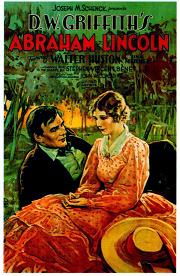Reception
The film received positive reviews from contemporary critics. Mordaunt Hall of The New York Times called it "quite a worthy pictorial offering with a genuinely fine and inspiring performance by Walter Huston in the role of the martyred President" [3] and later put it on his year-end list of the ten best films of 1930. [4]
"More than an outstanding classic of sound pictures, Abraham Lincoln eclipses the most conservative illusion of a modernized Birth of a Nation", wrote Variety in a rave review. "It is a startlingly superlative accomplishment; one rejuvenating a greatest Griffith. In characterization and detail perfection it is such as to be almost unbelievable." [5] Film Daily called it a "distinguished and human narrative" and wrote that Huston's performance "may be listed as one of the 10 best of the year – or any talker year." [6]
John Mosher of The New Yorker wrote that it was "by and large.....a pretty high-grade picture." [7] Despite these accolades, however, the film's box office performance was uneven. [8]
Historical accuracy
The film covers some little-known aspects of Lincoln's early life, such as his romance with Ann Rutledge, his depression and feared suicidal tendencies after her death, and his unexplained ending of his engagement with Mary Todd. However, the film surmises that the cause was because of his unresolved feelings over Ann Rutledge, and it adds a dramatic scene in which Lincoln stands Mary up on their scheduled wedding day. In reality, Lincoln ended the engagement before the wedding day. He later had regrets about his decision and returned to ask Mary's hand in marriage, and they were married, as happens in the film.
While the early scenes of Lincoln's life are remarkably accurate, many of the later scenes contain historical inaccuracies. The Lincoln-Douglas debates, in addition to the historically accurate topic of the extension of slavery, are turned into an argument about secession. Lincoln was an underdog for the Republican Presidential nomination in 1860, but the film suggests that he was the sole nominee as a result of the Lincoln-Douglas debates.
The outbreak of the Civil War seems to be the Union firing on Charleston, South Carolina from Fort Sumter rather than the other way around. Also, early in hostilities, General Winfield Scott is depicted as being overconfident of a quick victory and something of a buffoon, but in reality, he was one of the voices in the minority claiming the war would be long, costly, and bloody.
In the film, Lincoln receives a report from the Secret Service that some Copperheads in the North have issued threats against him. However, in reality, the Secret Service was not created until two months after Lincoln's death.
Finally, in the film's climax, Lincoln delivers a conflation of the words of the Gettysburg Address and Second Inaugural Address at Ford's Theatre on April 14, 1865, moments before his assassination. This movie was Griffith's second portrayal of Lincoln's assassination, and the first was in The Birth of a Nation .
Legacy
More recent assessments of Abraham Lincoln have been less effusive in their praise of the film, finding that Abraham Lincoln has not aged well. In 1978, the film was included as one of the choices in the book The Fifty Worst Films of All Time , criticizing the film's historical inaccuracies, instances of clumsy dialogue and Merkel's melodramatic acting style. [10] Glenn Erickson, reviewing the DVD in 2012, wrote that it "comes off as an interesting curio. Its earnest simplicity seems more dated than ever, despite the fine performance of Walter Huston in the lead role." [11]
Film historian Melvyn Stokes found that Abraham Lincoln's episodic structure "came at the cost of dramatic tension" and suggested that the film's disappointing box-office performance was due to its having "nothing of major importance and relevance to say about its subject to moviegoers of Depression-era America." [12] Abraham Lincoln was the first sound film about the Civil War which veterans of that war could view.
This page is based on this
Wikipedia article Text is available under the
CC BY-SA 4.0 license; additional terms may apply.
Images, videos and audio are available under their respective licenses.
